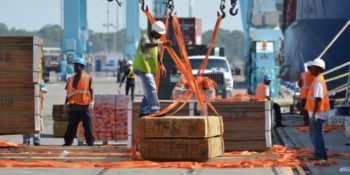
Some of Spain’s biggest port terminals came to a standstill on Monday as shipping companies redirected cargos to avoid a dockers’ strike.
After months of talks between unions, companies and the Spanish government over a reform of port hiring practices, dockers held the first of several planned strikes to protest against possible job losses.
Some container shipping firms such as Maersk re-routed boats destined for the southern port of Algeciras to get around the strike, during which dockers will stop working every other hour on Monday, Wednesday and Friday this week.
Alternative destinations used by firms included Portugal, Morocco and Malta.
Five further days of industrial action have also been called for next week, raising the prospect that the shift to rival ports could have lasting consequences, especially for those handling merchandise not ultimately destined for Spain.
“Let me tell you, eight days of strikes will completely shatter the port of Algeciras,” Manuel Moron, who heads up the port authority there, wrote in a column, in EuropaSur local newspaper on Monday.
Algeciras is a trans-shipment hub used by firms to unload cargo and redistribute it onto other boats heading elsewhere in Europe or the Middle East.
An Algericas terminal operated by APM Terminals, which belongs to the Maersk Group, had ground to a halt on Monday as there were no ships, a port spokeswoman said. A second smaller terminal was operating during the hours between the strike.
Valencia, on the eastern Mediterranean coast and the biggest export and import port in Spain, was functioning during the appointed hours, a spokesman said.
Spanish companies adjusted their production strategies, staggering exports or speeding them up before the strike, to limit the knock-on effects on their business. About two thirds of Spain’s imports and exports, a key element of the recovering economy, are moved through the country’s docks.
Seat, part of German carmaker Volkswagen and which has a big plant near Barcelona’s port, had already shipped out vehicles as soon as they were ready to avoid a build-up in cars waiting to be exported, a source at the company said.
The government said minimum services were being upheld at ports to ensure perishable goods such as fruit and vegetables were getting through and passenger services were not disrupted.
The ports reform, which aims to crack down on closed-shop hiring in a heavily unionised sector as demanded by the European Union, was passed through parliament in mid-May after a series of setbacks and clashes between political parties.
Workers broke off subsequent talks with port representatives over how to implement the new law in a disagreement over safeguarding more than 6,000 docker jobs.